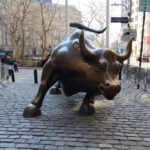Martin Scorsese’s 2013 film, The Wolf of Wall Street, starring Leonardo DiCaprio, is a cinematic rollercoaster that plunges viewers into the opulent and corrupt world of high-finance in the late 1980s and 1990s. Based on the memoir of Jordan Belfort, the movie chronicles his meteoric rise and dramatic fall as a stockbroker who made millions by defrauding wealthy investors. This dark comedy is not just a biopic; it’s a scathing commentary on American excess, greed, and the intoxicating allure of wealth.
At the heart of the film is Jordan Belfort, portrayed with captivating energy by Leonardo DiCaprio. Belfort, a charismatic and ambitious young man, starts his career with honest aspirations but quickly becomes seduced by the get-rich-quick culture of Wall Street. Under the tutelage of the debaucherous Mark Hanna (Matthew McConaughey in a memorable supporting role), Jordan learns the art of the sale and the intoxicating power of money. This mentorship, though brief, sets the stage for Jordan’s future trajectory, highlighting the corrupting influence of the financial world.
Driven by an insatiable hunger for wealth and fueled by drugs and hedonism, Belfort establishes his own brokerage firm, Stratton Oakmont. He assembles a team of equally ambitious and morally flexible brokers, including Donnie Azoff (Jonah Hill), who become his loyal lieutenants in a vast scheme of pump-and-dump stock manipulation. Stratton Oakmont quickly becomes a den of debauchery and illegal activity, showcasing extravagant parties, drug use, and unethical business practices. The film doesn’t shy away from depicting the excessive lifestyle of Belfort and his cohorts, painting a vivid picture of their lavish spending and reckless behavior.
Leonardo DiCaprio portraying Jordan Belfort, delivering a motivational speech to his Stratton Oakmont employees.
Image alt text: Leonardo DiCaprio as Jordan Belfort passionately addresses his Stratton Oakmont team, embodying the film’s themes of ambition and financial drive.
The Wolf of Wall Street masterfully portrays the allure and dangers of unchecked ambition. Belfort’s charisma and salesmanship are undeniable, drawing in both investors and employees to his fraudulent schemes. The film explores how easily individuals can be swayed by the promise of wealth and power, even at the expense of ethical considerations and legality. It raises questions about the nature of ambition itself – when does drive become greed, and where is the line between success and corruption?
Beyond the personal journey of Jordan Belfort, the movie also serves as a critical examination of Wall Street culture. It exposes the rampant corruption and lack of accountability that permeated the financial industry during this period. Scorsese doesn’t simply present Belfort as a lone wolf; he depicts a system that enabled and even encouraged such behavior. The film suggests that Belfort’s actions were not an anomaly but rather a symptom of a larger systemic problem within the financial world.
The supporting cast of The Wolf of Wall Street is equally compelling, contributing to the film’s vibrant and chaotic energy. Jonah Hill’s portrayal of Donnie Azoff is both comedic and disturbing, showcasing the moral decay that permeates Stratton Oakmont. Margot Robbie, as Naomi Lapaglia, Belfort’s second wife, embodies the allure and superficiality of the lifestyle he craves. Kyle Chandler as Agent Patrick Denham, the FBI agent investigating Belfort, provides a contrasting moral compass, representing the forces of law and order attempting to rein in the excesses of Wall Street.
Jonah Hill as Donnie Azoff and Leonardo DiCaprio as Jordan Belfort in a scene depicting their close partnership and illicit activities.
Image alt text: Jonah Hill and Leonardo DiCaprio, as Donnie Azoff and Jordan Belfort, captured in a frame highlighting their criminal collaboration and the movie’s dark comedic tone.
Scorsese’s direction is characteristically dynamic and visually arresting. He employs fast-paced editing, voiceover narration, and fourth-wall breaks to create an immersive and engaging viewing experience. The film’s soundtrack, featuring a mix of rock and hip-hop, further enhances the energetic and chaotic atmosphere. While the film is undeniably entertaining, it also provokes thought and discomfort, forcing viewers to confront the darker aspects of human nature and the seductive power of money.
The Wolf of Wall Street was met with both critical acclaim and controversy upon its release. Praised for its performances, direction, and darkly comedic tone, it was also criticized by some for glorifying Belfort’s criminal behavior. However, many argue that the film is not an endorsement but rather a cautionary tale, exposing the dangers of unchecked greed and the devastating consequences of financial corruption. Regardless of interpretation, the film remains a powerful and unforgettable cinematic experience.
In conclusion, The Wolf of Wall Street is more than just a biographical crime film; it’s a potent exploration of ambition, greed, and the corrupting influence of wealth. Through the outrageous story of Jordan Belfort, Martin Scorsese delivers a sharp and often hilarious critique of Wall Street culture and American excess. The film’s lasting impact lies in its ability to entertain and provoke, prompting audiences to reflect on the ethical dilemmas inherent in the pursuit of the American Dream and the seductive, yet ultimately destructive, nature of unchecked financial power.
Margot Robbie portraying Naomi Lapaglia, showcasing the glamour and allure of the opulent lifestyle in The Wolf of Wall Street.
Image alt text: Margot Robbie as Naomi Lapaglia embodies the film’s depiction of luxury and the superficiality associated with Jordan Belfort’s wealth and Wall Street lifestyle.

